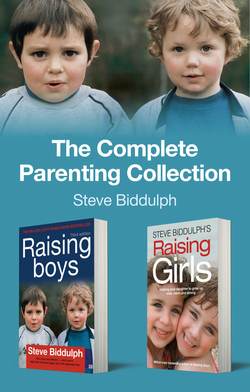Читать книгу The Complete Parenting Collection - Steve Biddulph, Steve Biddulph - Страница 90
At secondary school
ОглавлениеBy secondary school, living with a boy is more a matter of fair exchange – ‘I’ll drive you there if you help me out here’, ‘If you cook, I’ll clean up’. A boy can accept the clear separation of his activities from yours. But stay friendly and available so that talking can still happen. Be sure to still have special times one-to-one. Stop for a drink and talk on shopping trips. Go out to the movies together, and have time after to talk.
Some boys still love cuddles at this age, while others find it too intrusive. Find ways to show affection that are respectful of his wishes. Sit close on the couch, stroke his head at bedtime, tickle him – find the ways that he doesn’t mind.
You may have to make a stand against a school or a sport wanting to dominate your kid’s life too much. (See ‘Homework Hell’). Allow your son to have a ‘health day’ or two once a term – a day off school when he doesn’t have to be sick, but can be peaceful by himself.
Towards the end of high school, around the pressured time of major exams, help your son to study, but take a position that this is not the meaning of life, and that enjoyment and soul-time are also important. Let him know that his worth is not measured by exam results.
In Australia a kind of competitive madness has developed around Year 12 exams. They’re portrayed as the make-or-break year of a person’s life. We can blaze a middle road here, encouraging kids to give school their best shot (all through late secondary school) but keeping it in proportion with the real goals of adolescence – which are to find what work you really love to do, while also developing socially and creatively.
Here are some points to consider:
Kids who get high Year 12 scores often bomb out at university, because they aren’t motivated by an actual interest in the subjects.
Courses like medicine are starting to look for more balanced students who have done other degrees first or had other life experiences. Good exam results alone don’t make good doctors.
Well-balanced youngsters are happier, healthier and more likeable employees, and become more successful in professional careers.
Other courses and careers (such as teaching, nursing and ecology) can offer happier lifestyles and more human satisfaction than highly competitive fields like law, medicine and economics.
